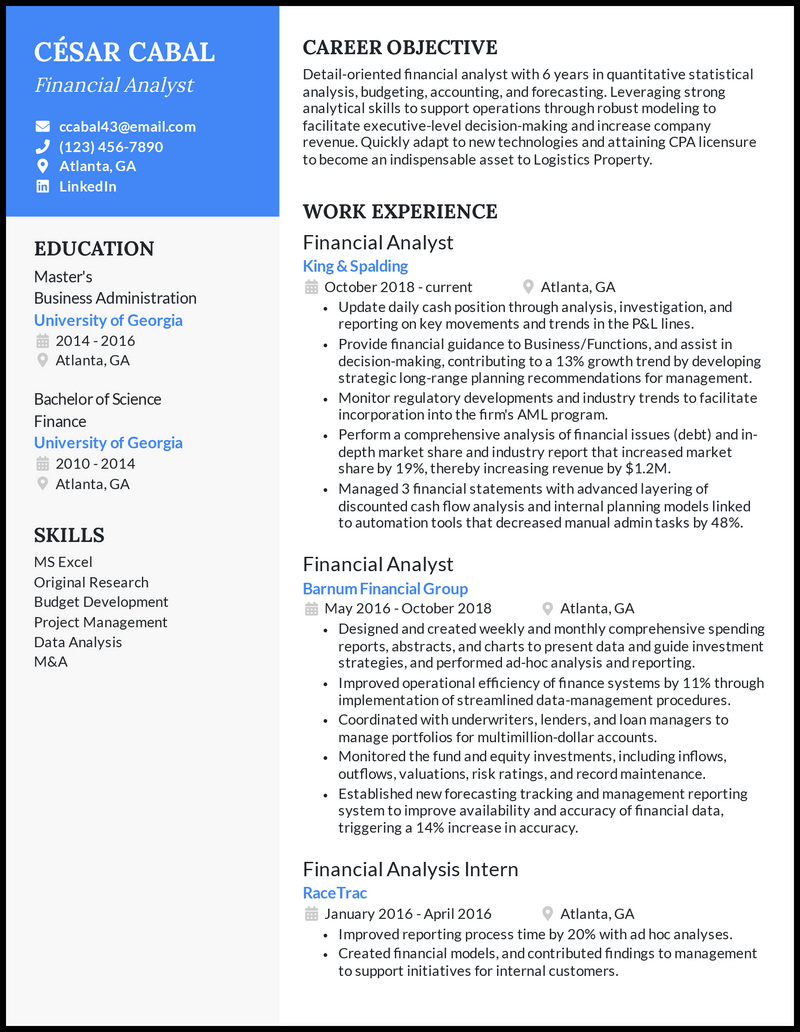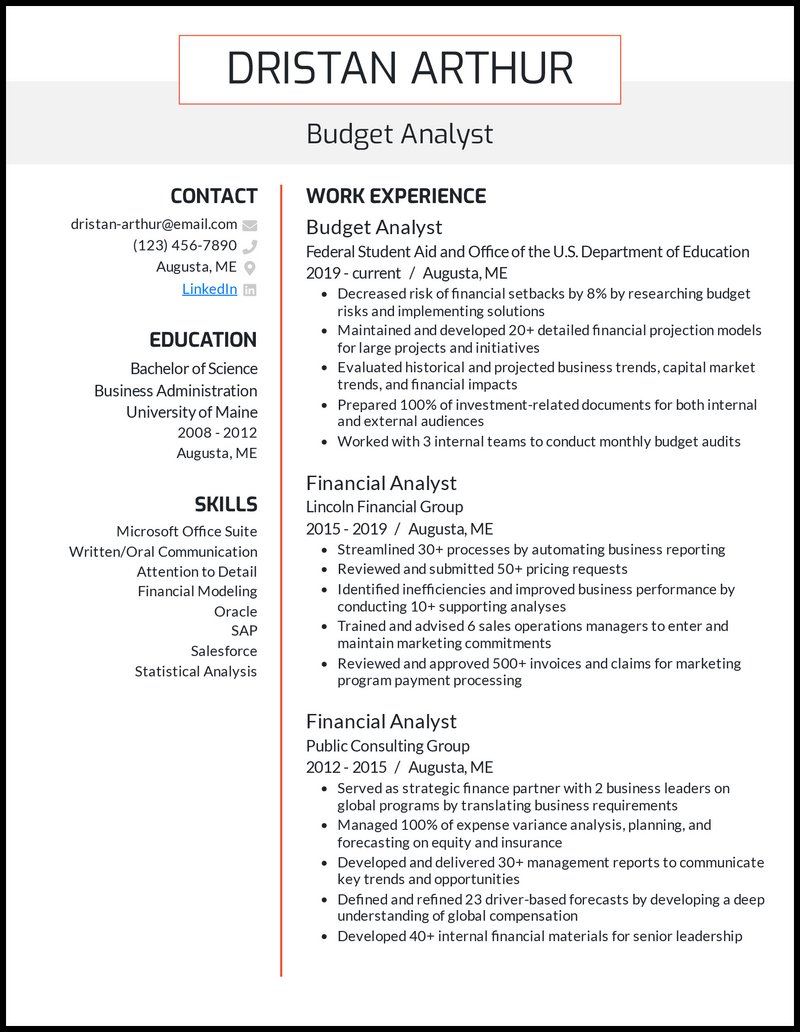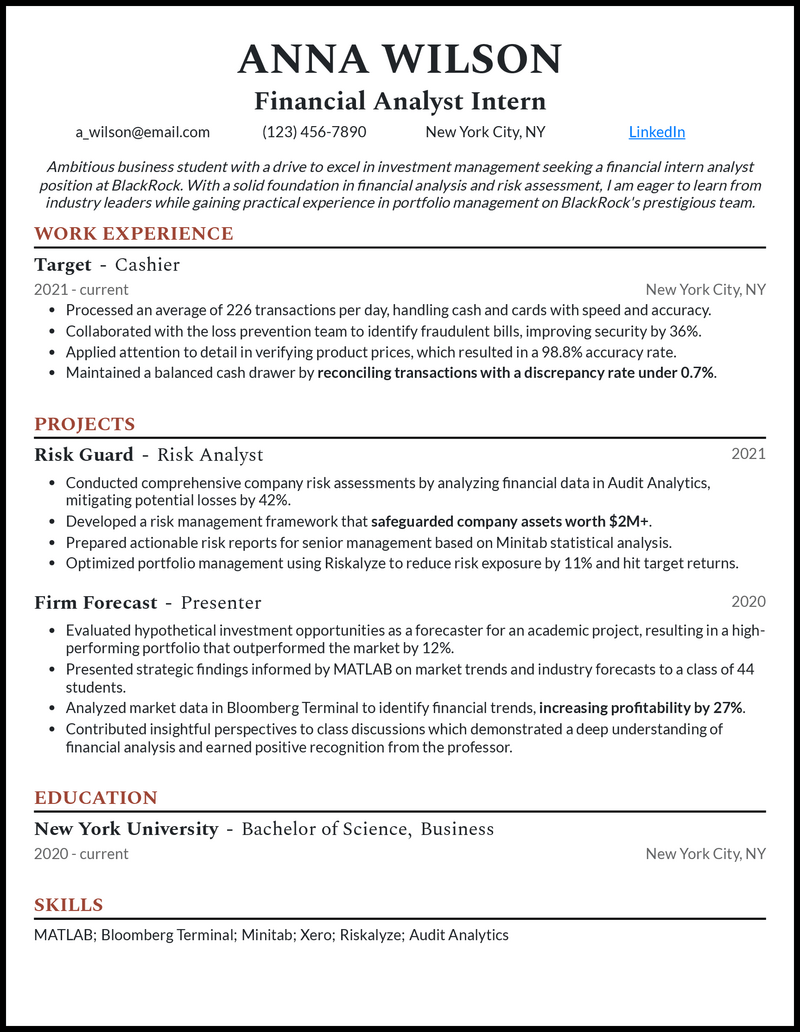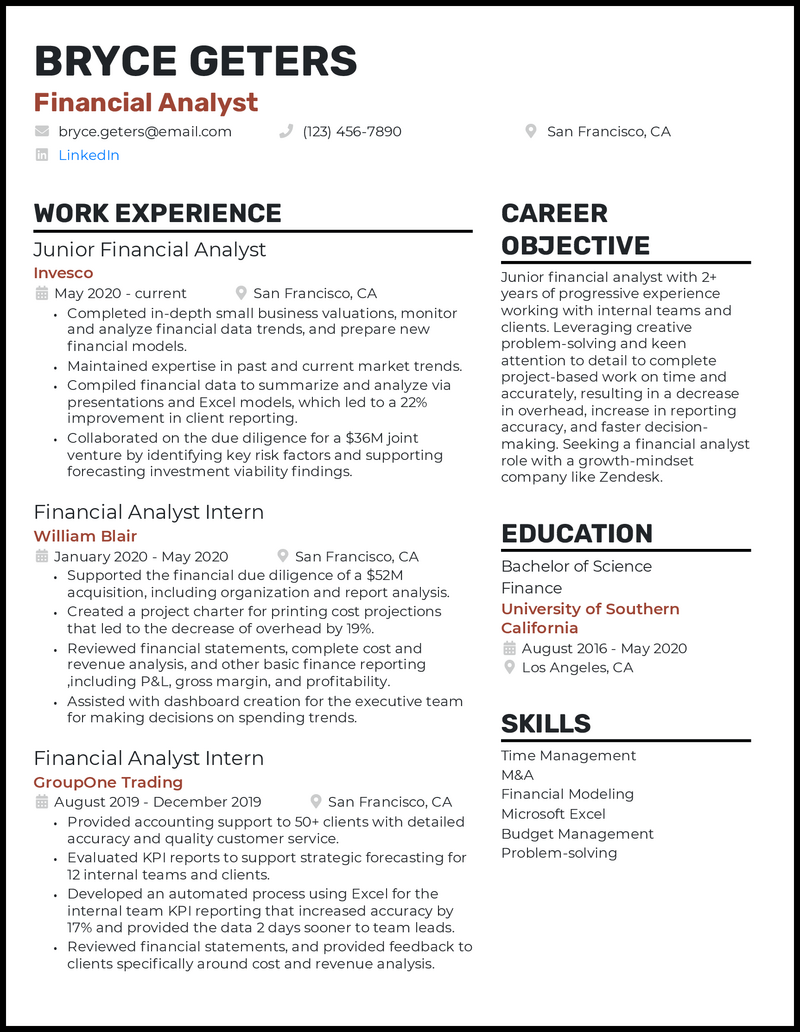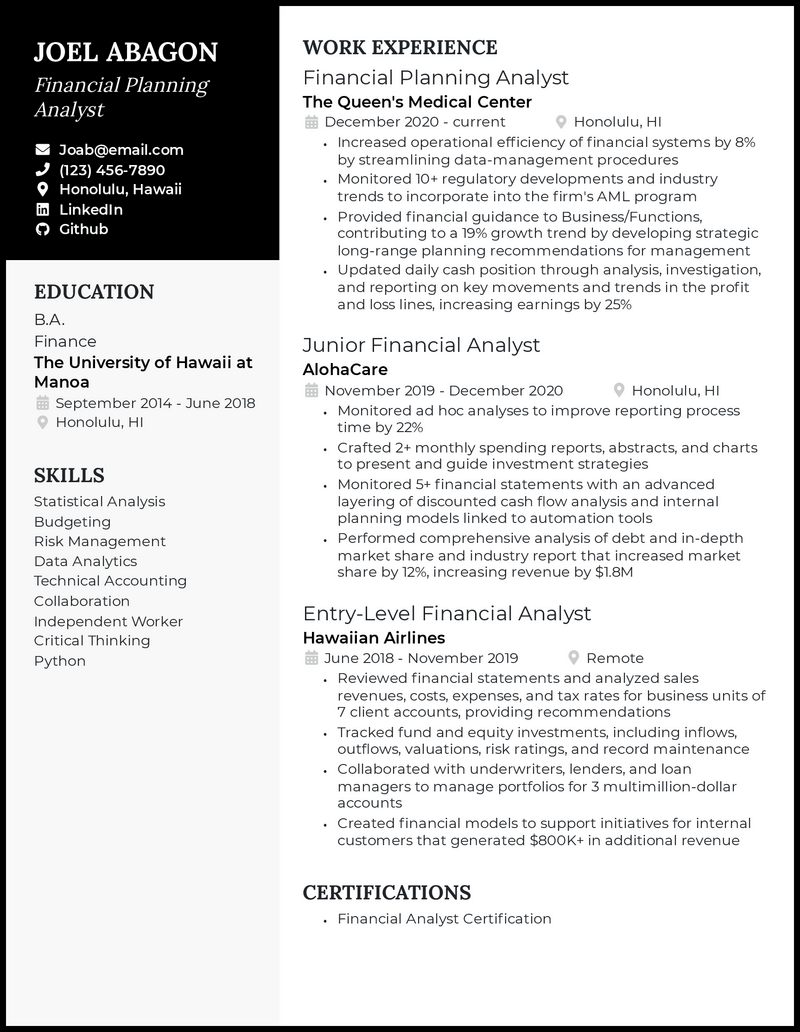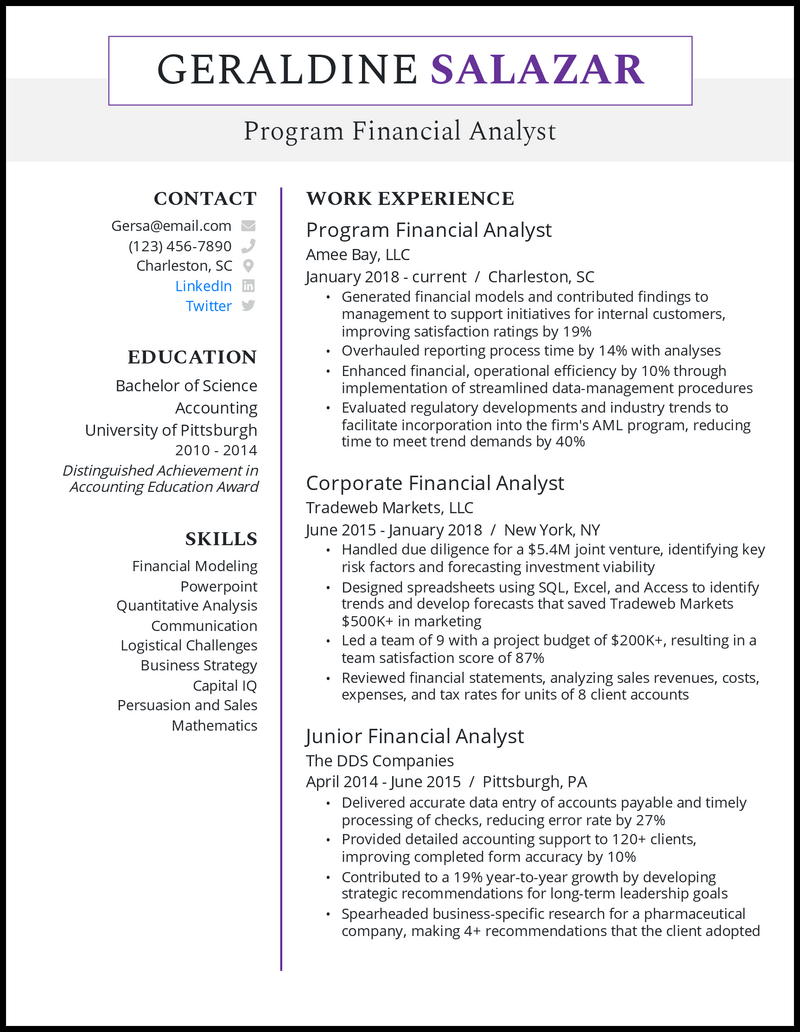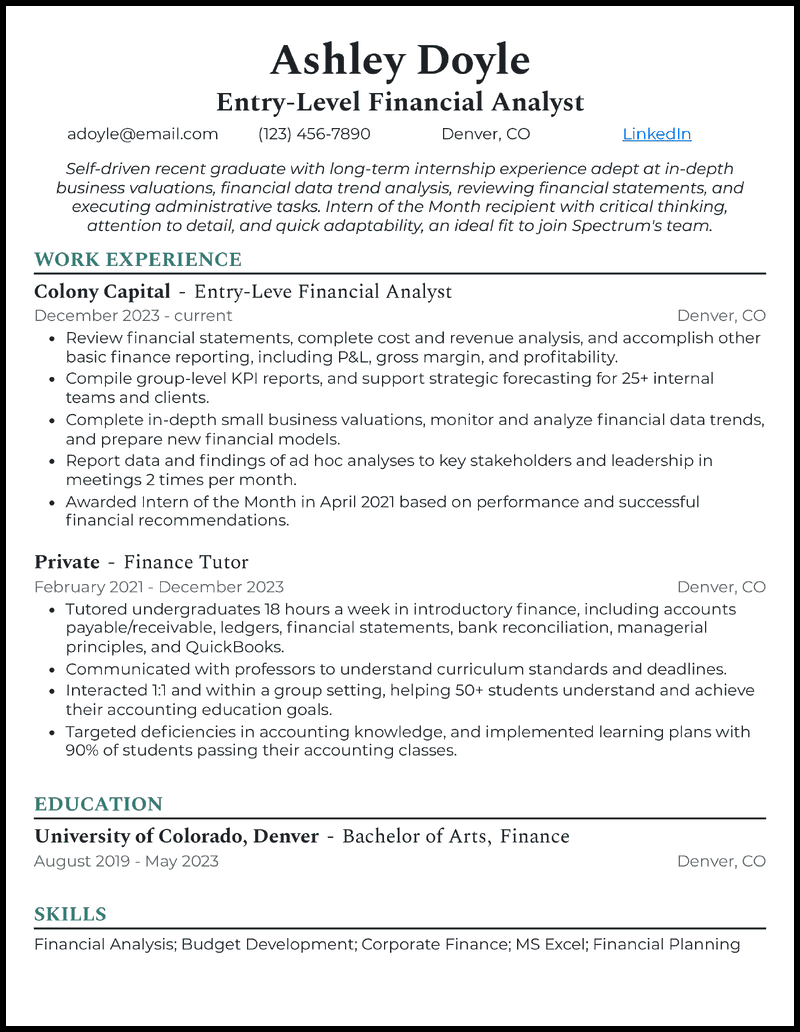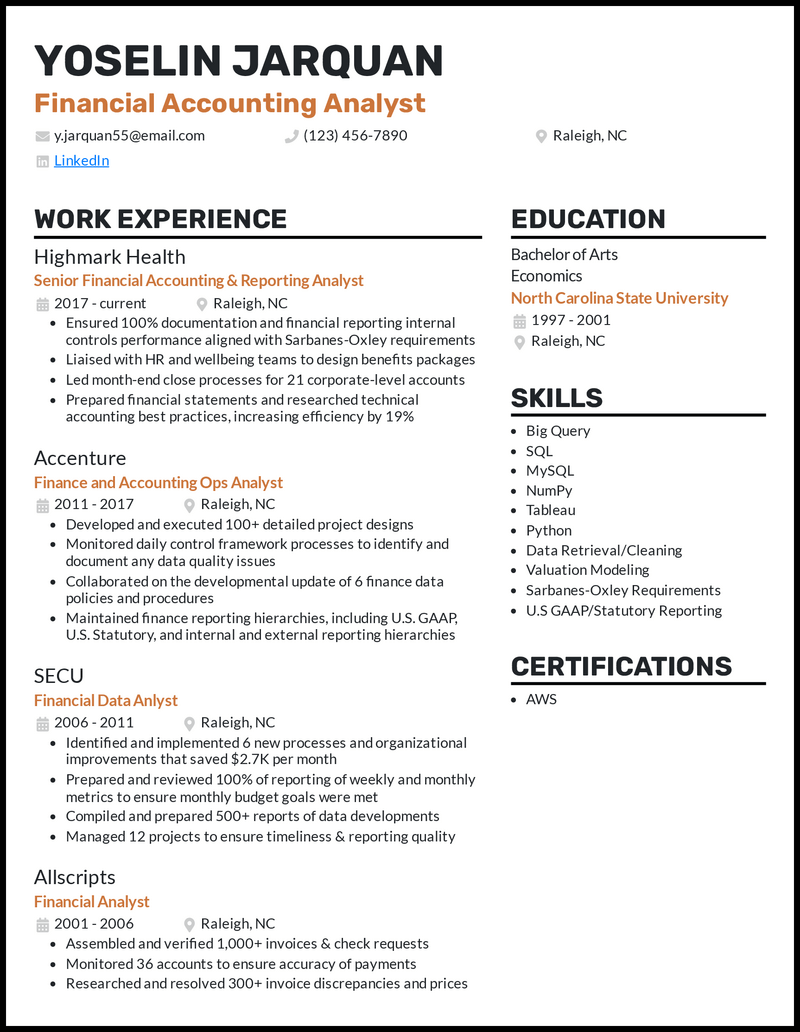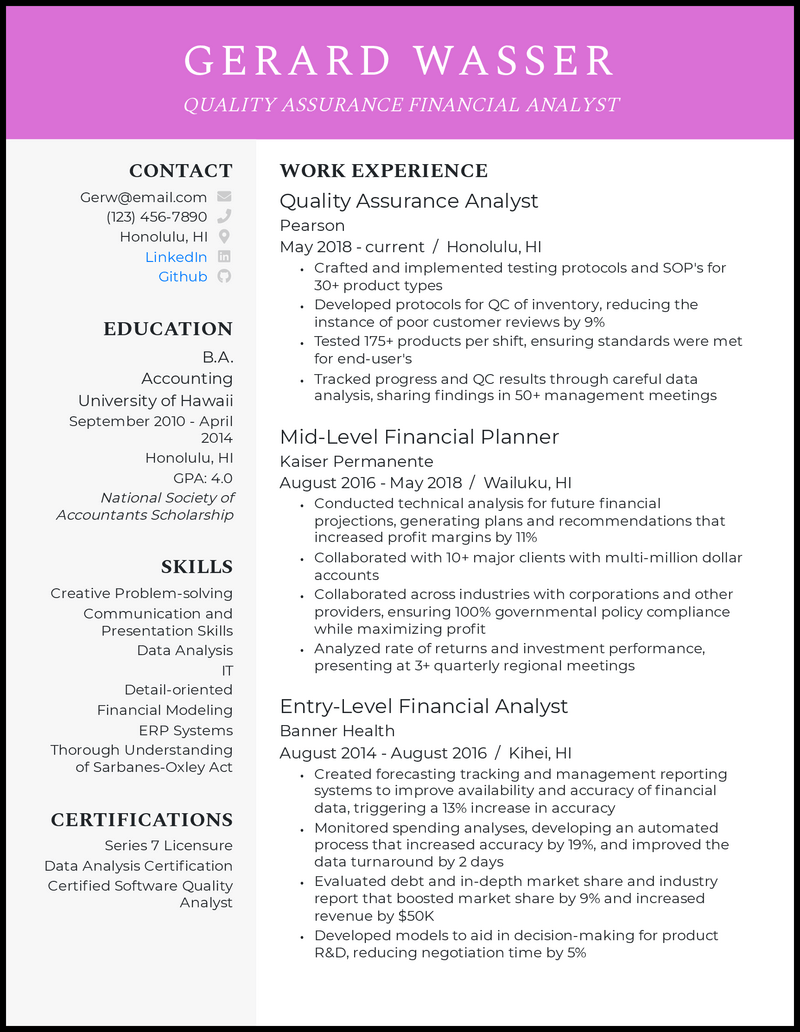To make your financial analyst resume stand out, highlight your measurable achievements and match them to the requirements of the job you want.
To do this, write a resume that shows your skills with technical tools, any industry certifications you have, and your measurable achievements. These details show the value you can bring to a business.
No matter if you are looking for an entry-level, international, or program financial analyst job, you will learn how to write a strong resume and improve your job search.
Here’s what we’ll cover:
- ↪ Expert resume tips to help you impress recruiters
- ↪ 17 real financial analyst resume examples to inspire you
- ↪ How to format your resume for clarity and impact
- ↪ What to include when creating a resume for a financial analyst job
Why this resume works
- Focus your financial analyst resume experience on how close your projections and forecasts were for the company and how those accurate projections and forecasts helped the business. Run your resume through a resume checker to ensure you include enough stats and don’t have grammar or punctuation errors, but don’t forget to check it yourself.
Why this resume works
- Your senior financial analyst resume should highlight leadership achievements and your team’s performance. Don’t be afraid to brag about your team’s size, your project’s budget, the number of projects you completed on time, and core competencies.
See more senior financial analyst resumes >
Why this resume works
- Don’t worry if you have too many jobs to list on your budget analyst resume. You only need to show three to four of your most relevant roles. Use your resume’s skills section to supplement your employment history and give your accomplishments some technical context.
See more budget analyst resumes >
Why this resume works
- Detail your academic projects in risk analysis and forecasting to demonstrate well-rounded experience and show your experience on both sides of the business on your financial analyst intern resume.
Why this resume works
- As with all financial analysts, your resume needs to showcase your ability to gather data and information. The best way to do this is by tailoring your junior financial analyst resume with the financial analyst job description.
See more junior financial analyst resumes >
Why this resume works
- Your financial reporting analyst resume needs the perfect format. Use fonts that don’t require a magnifying glass to read and look modern—think Arial or Calibri. Also don’t forget about some white space, and short, easy-to-parse section headings that actually tell something useful.
Why this resume works
- Make your financial planning analyst resume great by highlighting your vast array of skills including financial reporting, data management, trend projections, and advanced economic modeling.
See more financial planning analyst resumes >
Why this resume works
- Optimize your LinkedIn profile and ensure that it mirrors what’s on your resume and even offers more deets about your skills (cue Bloomberg Terminal, QuickBooks, SAP ERP, and Tableau) and complete work history.
Why this resume works
- There’s no need to rack your brains all day trying to figure out how to catch the recruiter’s eye and stand a chance of getting an interview invitation—a suitable healthcare financial analyst resume format could be the silver bullet.
Why this resume works
- It may require more work up front, but customizing your program financial analyst resume specifically for each job application is essential. If you target your bullet points for each job to which you apply, hiring managers are more likely to give you an interview over a generalist resume.
Why this resume works
- Reiterate your professional value on your chartered financial analyst resume by going beyond your best investments and drawing attention to your track record with clients. Try employing story-telling techniques in your financial analyst cover letter to demonstrate your success with clients.
Why this resume works
- Take our word for it; using reverse chronological order in your financial crime analyst resume is one of the most effective tricks for impressing recruiters. Paint a beautiful portrait of your growth-focused mentality by listing the latest role and taking the reader through your career journey.
Why this resume works
- You can highlight transferable skills on your entry-level financial analyst resume. Competencies like communication, data reporting, and scheduling show employers you’re organized, detail-oriented, and able to work together in a team.
See more entry-level financial analyst resumes >
Why this resume works
- Unless you want to take yourself out of the running, go the extra mile to make your real estate financial analyst resume stand out and show recruiters that smashing goals is your thing. Our favorite trick? Quantify outcomes in your pitch.
Why this resume works
- Make sure your financial accounting analyst resume focuses heavily on metrics. Recruiters for this particular field want to see numbers, so put your money where your mouth is.
See more financial accounting analyst resumes
Why this resume works
- A polished international financial analyst resume that highlights your career progression and affirms you’re in it for the long haul could be your passport to the bustling avenues of Wall Street. And what better way to structure it than using the reverse chronological order?
Why this resume works
- Your quality assurance financial analyst resume doesn’t have to be boring—consider using a resume template to add some structural elements and color. Some formats allow for longer content while others focus more on other sections, so try out a couple to see what works.
How to Write a Financial Analyst Resume

To write a strong financial analyst resume, focus on tailoring each section to highlight results, relevant tools, and business impact. Your main goal is to prove your impact with clear metrics, sharp formatting, and a story that aligns with the role you want.
Ensure to include key elements like a sharp career summary, in-demand skills, and a format that is easy for recruiters and ATS to scan.
Here’s what you’ll learn in this section:
- How to format your resume for readability and ATS compatibility
- What skills and certifications financial analyst roles typically require
- How to write a compelling career summary that shows your value
- Tips for showcasing achievements with numbers, not just duties

Resume format & ATS compatibility
You might be tempted to think that the only thing that matters on your resume is the content, but proper resume formatting is almost as important. Even if you have decades of impressive financial analyst experience, it’ll be hard for a hiring manager to look past poor formatting. A well-formatted resume will be readable for ATS and logical for hiring managers who only have a few moments in their day to look at your resume.
Let’s review some of the most important aspects of resume formatting, including and not limited to what Princeton University’s resume guide says:
- Resume formatting choices
- How to include your contact information
- Outwit the ATS

Resume format choices
Each of the following formats performs a particular function, highlighting your work experience, skills, or both.
Three resume format favorites among successful job applicants in 2026.
- Reverse-chronological format: This format is exactly what you think: it orders your work experience starting from the most recent. This format will help hiring managers see your most relevant (and likely most impressive job title) first.
- Functional format: Unlike the reverse-chronological format, the functional formats place the most emphasis on skills. If you have employment gaps, you may want to consider this format, but be aware that hiring managers may be confused or wonder if you’re being forthcoming.
- Combination/hybrid format: This format weights work experience and skills equally by combining functional and reverse-chronological formats.
For financial analysts, we almost always recommend reverse-chronological formatting. Hiring managers love that it’s easy to read and skim, and you’ll love that it showcases your most senior position.

How to include your contact information
When a hiring manager wants to reach out for an interview, it’s important to make your name, phone number, and email easy for them to find. Ensure your contact information is highly visible by placing it at the very top of your financial analyst resume.
Use a large font for your name and a large (but slightly smaller) font for your job title. Both your name and your job title should be centered in the header.
If you want to try using color in your resume we suggest using the color as the backdrop for your contact information header. Professional colors for financial analysts include navy, amber, or dark green.
Below your header, you’ll need to include contact information, which should include:
- Phone number
- Your city and state (optional but recommended if it’s a local business)
- Professional links, such as LinkedIn (optional)
Like the example below, you can do a lot with your header to showcase your creativity while remaining professional.


How to outwit the ATS
If you’re applying to an online job posting, the chances are high that the hiring manager is using applicant tracking system software (ATS) to pre-filter applicants.
The ATS works by picking up on words used throughout your resume and matching them to keywords selected by recruiters (usually keywords in the financial analyst job description). If you don’t have enough keyword matches, your resume may be thrown out before anyone can read it. That’s why a keyword scanner can help ensure your resume is ATS-friendly.
Be careful to adhere to the following formatting guidelines:
- Margins: Use standard one inch margins, or at the very least half an inch, if needed to save space.
- Font type: Keep it basic by using Times New Roman, Arial, Cambria, or Garamond.
- Font sizes: The body of your resume should be a 12-14-point font, but you can make it slightly smaller (but only slightly) if needed. Your job title should be larger, around 20-point font, and your name should be about 24-point font.
- Header names: Use colors, bolding, or complementary fonts to help your subheaders stand out throughout your resume. Just make sure your font is readable.
- Skills: Customize your skills section for every job to which you apply. Carefully read the job descriptions to determine what keywords the recruiters will be scanning for while avoiding plagiarizing their job posting!
- Logical order: As we mentioned earlier, reverse-chronological order is the best for your financial analyst resume, and ATS operates under the assumption that your resume is formatted this way.
- Page count: Do everything you can (adjust font and margin, within reason) to fit the page perfectly. Your resume will look unprofessional and burdensome to read if it’s over a page. If your resume is a little short, recruiters will wonder if you’re inexperienced.
Formatting your resume isn’t easy at first, but once you’ve used an AI resume maker for the first time, all you need to do is minor tweaks for each job application.

Write your financial analyst resume
Writing your financial analyst resume can be difficult, so take it one section at a time. Take advantage of a free Google Sheets job tracker to minimize a lot of stress.
Without further ado, let’s dig into the content of your financial analyst resume. Here’s what we’ll cover:
- Using a resume objective or summary statement
- Writing about your work history
- Key skills for financial analysts
- Education and optional sections
- Customizations
- Flawless editing

Understand the elusive objective/summary statement
Objectives and summaries are some of the most commonly misunderstood sections on a resume, but they can be useful. However, choosing between a resume objective or a resume summary is difficult because there are only a few circumstances in which you’ll use either one.
Both are highly job-specific, two to three-sentence paragraphs used near the top of your resume (often under your job title). An objective is for entry-level candidates or job seekers who have recently changed fields. An objective will tell hiring managers why you want the job.
On the other hand, a summary is for professionals with over 10 years of experience in a specific field. It highlights skills you’ve developed and biggest achievements. If you use it, ensure it closely matches what you have on your LinkedIn summary for consistency.
Neither the objective nor the summary is a mandatory inclusion on your resume, but these statements can enhance your resume and boost your chances of getting hired. Let’s go over a few examples:
Example 1: Young professional seeking a job at your office to continue advancing my career in finance.
What could be improved: This is a poorly written resume objective. You should mention the specific job title you’re applying to, the company name, and one to three highly-specific skills you possess that will improve or contribute to the company’s operations.
Example 2: Working in finance with experience in organizing and communicating.
What could be improved: This summary is too bare-bones. It contains no meaningful information and just takes up space.
Example 3: Financial analyst with 7+ years of experience specializing in informative and persuasive professional presentations, seeking a role to utilize my depth of ROI and client relations skills as a team player at Spectrum.
What we like: This objective and the example below mention a specific job title, the company name, and the skills they bring to the table. It’s short and effective.

Example 4: Data-driven financial analyst with 23 years of business valuation and trend analysis under 3 major Fortune 500 corporations. With skills across many areas of data analysis and presentation, trend forecasting, and financial advisement, I provide a wealth of knowledge and business know-how to companies with which I’ve worked. I am eager for an opportunity to improve ROI in several key areas to optimize growth at BetterMent.
What we like: This summary (and the example below) are specific and contain information that makes this candidate an obvious choice. The applicant above also points directly to an area they know they can improve business operations. You want a hiring manager to read your summary and think, “we need this person.”


How to showcase your quantifiable achievements financial analysis
It should come as no surprise to you that the most important section of your financial analyst resume is your work history. It can be tempting to cram every job title you’ve held onto the page, but hiring managers prefer applicants who focus on the most relevant and recent work experience they’ve had. You can share information about older jobs and internships during your interview! You’ll want to include two to four job experiences.
Write descriptive bullet points
Your work experience should be broken down into bullet points, which make your resume look more organized and easier for hiring managers to read.
- Throughout your bullet points, you’ll want to avoid passive voice, which can make text boring to read and unengaging. Instead, use active voice, which exudes confidence and ownership of your work. Adding action words to start each bullet point, like “operated,” “spearheaded,” and “orchestrated,” will further engage readers and break up your text.
- You’ll also want to be careful to avoid personal pronouns, like “I” or “my.” Employers already know you’re writing about yourself, and personal pronouns sound unprofessional.
- You can choose to end all of your bullet points with or without periods. Consistency is key.
- Finally, you’ll want to consider verb tense. You can leave your current work experience in the present or past tense, but all of your former work experience must be in the past tense.
Here are a few examples of good bullet points that incorporate these tips:
- Oversaw the financial due diligence of a $52M acquisition, including organization and report analysis
- Developed an automated process using Excel for the internal team KPI reporting that increased accuracy by 17% and provided data 2 days faster to team leads
- Monitored 10+ regulatory developments and industry trends to incorporate into the firm’s AML program
These bullet points are perfect for a financial analyst resume. They’re written in active voice, using action verbs, avoiding personal pronouns; they’re all written in the past tense, with consistent punctuation.
Leverage numbers
Numbers demonstrate your value to the company, unlike words alone. We’ve interviewed countless hiring managers to ask them what they consider the most important element of a successful resume; almost unanimously, they’ve reported that metrics made applicants much more likely to get interviews. For the best results, aim to include quantifiable metrics on at least 50 percent of your bullet points.
Here are a few ways you might consider adding metrics about your past roles in financial analysis:
- Hard numbers: Discuss the details of your work. What percentage have you increased ROI? What percent have gross earnings increased for the company during your time of employment?
- Sales: Discuss the rate of potential clients converted from your presentations, the number of presentations you provided, and the success of your sales strategies.
- Reports: Have you successfully forecasted trends? Have your abstracts and internal presentations resulted in financial gain for the company?
- Collaboration: Financial analysts need to collaborate across departments frequently. Let employers know you collaborate well with others by detailing the number of people or departments with which you’ve worked.
If you’re having trouble visualizing how you’d use these questions to come up with numbers, don’t worry. Here are a few examples:
- Provided financial guidance to Business/Functions, contributing to a 19% growth trend by developing strategic long-range planning recommendations for management
- Collaborated with 10+ major clients with multi-million dollar accounts
- Created forecasting tracking and management reporting systems to improve the availability and accuracy of financial data, triggering a 13% increase in accuracy
- Evaluated regulatory developments and industry trends to facilitate incorporation into the firm’s AML program, reducing time to meet trend demands by 40%

Financial analyst skills and tools to include in your resume
The skills section is an important place to demonstrate your value to potential employers, not to mention it’s one of the best places to include keywords for ATS. Unfortunately, many hopeful applicants don’t emphasize the right skills. The right skills for your financial analyst resume will depend on the specific job to which you’re applying.
Generally, we recommend including a mix of soft and hard skills, with the majority being hard skills because they’re easier to measure and more job-specific. Aim to include six to ten highly relevant skills on your resume.
Use the following financial analyst skills as examples to get you started:
- Financial Modeling
- Cash Flow Management
- Financial Reporting
- Quantitative Finance on Python
- Electronic Trading Systems Development
- Data Consolidation
- Predictive Analysis
- Industry‑specific tools: Bloomberg Terminal, SAP, QuickBooks
Why are these resume skills appropriate? We’ve included a mix of hard and soft skills specific, measurable, and highly desired by most employers. When looking for your next financial analyst job, be sure to read the job description carefully. Often, you’ll be able to pick up on which skills are the most important to your hopeful employers.
But, a word of caution: avoid overselling your skills. If you don’t know how to do something or are inexperienced, leave it off your resume. Hiring managers want honesty above all.

Education + optional resume sections
You probably already know that the financial analyst world can be a tough place in which to get your career started. Though there are no formal educational requirements, most employers will seek applicants with at least a bachelor’s degree in a relevant field.
Include the highest education level on your resume, but avoid including too much detail unless you’re a recent graduate with limited work experience. If you have minimal experience, you can utilize your education to demonstrate your working potential. Still, if you’re a more experienced applicant, you only need to provide your school name, graduation year, and degree.
There aren’t any formal requirements for certifications for financial analysts, but you should mention any specialized training you’ve received, such as a Financial Analyst Certification, Data Analysis Certification, or Certified Software Quality Analyst.
Finally, you may be wondering whether you should include any interests and hobbies to your resume. Generally, we don’t recommend including them, but there are a few instances where they’re appropriate additions to your resume:
- If you don’t have a great deal of work experience, it may be helpful to highlight some interesting hobbies or volunteer activities in which you’ve taken part. These can be great talking points during interviews if used appropriately!
- If you’re a recent graduate seeking your first finance job, you likely lack a lengthy work history to share on your resume. In this case, you can use interests and hobbies to convey to employers that you’re a hard worker and someone who thrives under pressure.

Tailor your financial analyst resume to the job ad
We’ve mentioned it a few times, but it’s important enough to reiterate. You need to tailor your financial analyst resume for every job to which you apply. Specifically, if used, your resume objective or summary statement needs to be customized with specific job titles and company names. Your skills section should be tailor-made to the job, too. You can do this by referencing skills mentioned in the job description (without ever copying anything from the job posting verbatim). Finally, your bullet points should be tailored to fit the specific needs of each company.
How to tailor for a healthcare financial analyst
Demonstrate on your healthcare financial analyst resume how you have enhanced quality, met regulatory requirements, controlled costs, and streamlined processes. Also, highlight how your work contributes to improved patient care through effective financial and personnel management.
Focus on these key areas:
- Financial reporting
- Experience in healthcare billing systems
- Include numbers that show cost savings, better services, or improved patient results
- Mention if you have used tools like Tableau or Cerner HealtheAnalytics
How to tailor for a real estate financial analyst
Show how your real estate financial analysis skills add value in property valuation, managing portfolios, giving investment advice, and reducing risks. Give examples of results that help build client trust.
Highlight these important points:
- Show your experience with investment analysis using discounted cash flow (DCF) and net operating income (NOI) models
- Include your work in market research and tracking how assets perform across different portfolios
- Share numbers that show portfolio ROI growth, higher occupancy rates, or increased property values
- Mention if you have used tools like ARGUS Enterprise, Power BI, or SQL for data modeling
How to tailor for an international financial analyst
Show that you are an international financial analyst with experience in multi-currency accounting, IFRS standards, and global consolidation. Point out your strong knowledge of cross-border rules and risk management, as these are valued by recruiters.
Focus on these areas:
- Include your experience with IFRS or GAAP for international companies
- Share numbers that show reduced forecast errors or improved audit efficiency
- Present expertise in tools like SAP or Oracle Financials

Identify and use the keywords recruiters care about
If you’re applying for the job online, there’s a high probability that ATS will screen your application. For your resume to pass those gatekeepers, you must use the right keywords. Go back to the job posting and review it one more time. Use a highlighter to circle repeated words, such as responsibilities, values, mission, vision, and other things the advert emphasizes. Now your highlighted circles are the phrases that you should optimize.
With the right keywords, your document will be at the top of the stack:
- Statistics
- Excel
- Data analysis
- Research
- Forecasting
- Cost
- NetSuite
- Process

Don’t submit a sloppy financial analyst resume
We know it’s difficult to take a step back after you’ve finished working on your financial analyst resume. However, we strongly recommend that financial analysts, and all job seekers, take a step back. Put your resume away for a day or two, and then look it over again for typos. Have friends or family proofread it, and take advantage of a free AI resume review.

Key takeaways
Let’s revisit everything you’ve learned here:
- Pick the right format
- Ensure your contact information is accurate and up to date
- Keep everything on one page
- Tailored to the specific job
- Proofread

One step closer to your next job
Congratulations! The first step to writing your professional financial analyst resume is research. If your resume is complete, you can upload it to see what AI-powered tips our resume checker has for you before making a cover letter.
If you haven’t started yet, or if you want to start your resume from scratch, use our resume builder. Both our resume checker and builder will analyze your resume and provide specific tips on how you can make improvements.
Financial Analyst Resume FAQs

A 2-3 sentence snapshot at the top of your resume declaring your interest in the vacancy and lines up your qualifications to back it up. One of its primary purposes is to connect with recruiters instantly and give a hint of your potential and what you have to offer if hired. The summary should include skills, at least one outstanding achievement, and your career vision.
Example:
“Seasoned financial analyst with a decade of experience delivering data-backed, transformative insights for Fortune 500 firms. Adept in financial modeling, forecasting, and data visualization. Led a cost optimization project, reducing annual operating costs by $1.2M. Thrives in fast-paced environments and solving real problems through smarter business decisions.”
Yes. You need a standout financial analyst resume to have any hopes of landing this job. A resume represents your serious intention to get the job by discussing why you believe you’re the best candidate and showcasing your skills and a record of achievements proving you’re tested and qualified for the role.
By writing a resume that highlights skills and experiences that align with your qualifications for the job posting. One of the two key things recruiters want to see in a potential financial analyst for whatever role is the practical and successful use of technical competencies to achieve expected results. The second is relevant work experiences from your present/past that mirror your ability to achieve excellent results in a similar or equally challenging role.
Land your next job with our AI-powered, user-friendly tool.
Gut the guesswork in your job hunt. Upload your existing resume to check your score and make improvements. Build a resume with one of our eye-catching, recruiter-friendly templates.
• Work in real-time with immediate feedback and tips from our AI-powered experience.
• Leverage thousands of pre-written, job-specific bullet points.
• Edit your resume in-line like a Google Doc or let us walk you through each section at a time.
• Enjoy peace of mind with our money-back guarantee and 5-star customer support.




